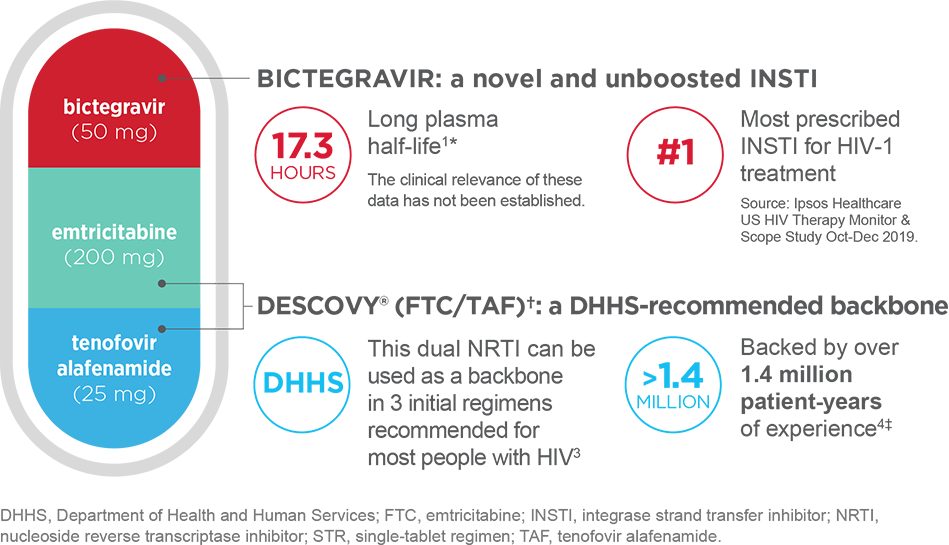BIKTARVY® is a triple therapy STR that pairs the power of bictegravir with a trusted dual-NRTI backbone.1,2

INDICATIONS
BIKTARVY is indicated as a complete regimen for the treatment of HIV-1 infection in adult and pediatric patients weighing ≥25 kg who have no antiretroviral (ARV) treatment history or to replace the current ARV regimen in those who are virologically suppressed (HIV-1 RNA <50 copies per mL) on a stable ARV regimen with no history of treatment failure and no known resistance to any component of BIKTARVY.
DESCOVY, a component of BIKTARVY, is indicated in combination with other antiretroviral (ARV) agents for the treatment of HIV-1 infection in patients weighing at least 35 kg.
IMPORTANT SAFETY INFORMATION FOR BIKTARVY AND DESCOVY
- Severe acute exacerbations of hepatitis B have been reported in patients who are coinfected with HIV-1 and HBV and have discontinued products containing emtricitabine (FTC) and/or tenofovir disoproxil fumarate (TDF), and may occur with discontinuation of BIKTARVY or DESCOVY. Closely monitor hepatic function with both clinical and laboratory follow-up for at least several months in patients who are coinfected with HIV-1 and HBV and discontinue BIKTARVY or DESCOVY. If appropriate, anti-hepatitis B therapy may be warranted.
Contraindications for BIKTARVY:
- Coadministration: Do not use BIKTARVY with dofetilide or rifampin.
Warnings and precautions for BIKTARVY and DESCOVY:
- Immune reconstitution syndrome, including the occurrence of autoimmune disorders with variable time to onset, has been reported.
- New onset or worsening renal impairment: Cases of acute renal failure and Fanconi syndrome have been reported with the use of tenofovir prodrugs. In clinical trials of emtricitabine and tenofovir alafenamide (TAF) with other ARVs, there have been no cases of Fanconi syndrome or proximal renal tubulopathy (PRT). Patients with impaired renal function and/or taking nephrotoxic agents (including NSAIDs) are at increased risk of renal-related adverse reactions. Discontinue in patients who develop clinically significant decreases in renal function or evidence of Fanconi syndrome.
Renal monitoring: Monitor renal function in all patients (see Dosage and administration). - BIKTARVY: Do not initiate in patients with estimated creatinine clearance (CrCl)
<30 mL/min. - DESCOVY: Do not initiate in patients with CrCl 15 to
<30 mL/min, or<15 mL/min who are not receiving chronic hemodialysis. - Lactic acidosis and severe hepatomegaly with steatosis: Fatal cases have been reported with the use of nucleoside analogs, including FTC and TDF. Discontinue if clinical or laboratory findings suggestive of lactic acidosis or pronounced hepatotoxicity develop, including hepatomegaly and steatosis in the absence of marked transaminase elevations.
- Drug interactions: See Contraindications and Drug Interactions sections. Consider the potential for drug interactions prior to and during BIKTARVY therapy and monitor for adverse reactions.
Adverse reactions for BIKTARVY:
- Most common adverse reactions (incidence ≥5%; all grades) in clinical studies through week 144 were diarrhea (6%), nausea (6%), and headache (5%).
- Most common adverse reaction (incidence ≥10%; all grades) in clinical studies was nausea (10%).
Drug interactions for BIKTARVY and DESCOVY:
- Prescribing information: Consult the full prescribing information for more information on Contraindications, Warnings, and potentially significant drug interactions, including clinical comments.
- Drugs affecting renal function: Coadministration with drugs that reduce renal function or compete for active tubular secretion may increase concentrations of FTC and tenofovir and the risk of adverse reactions.
- Enzymes/transporters: Drugs that induce P-gp or induce both CYP3A and UGT1A1 can substantially decrease the concentration of components of BIKTARVY. Drugs that inhibit P-gp, BCRP, or inhibit both CYP3A and UGT1A1 may significantly increase the concentrations of components of BIKTARVY. BIKTARVY can increase the concentration of drugs that are substrates of OCT2 or MATE1.
- Metabolism: Drugs that inhibit P-gp can increase the concentrations of components of DESCOVY. Drugs that induce P-gp can decrease the concentrations of components of DESCOVY, which may lead to loss of efficacy and development of resistance.
Information for BIKTARVY:
- Dosage: Patients weighing ≥25 kg: 1 tablet taken once daily with or without food.
- Dosage: Patients weighing ≥35 kg: 1 tablet taken once daily with or without food.
- Prior to or when initiating: Test patients for HBV infection.
- Prior to or when initiating, and during treatment: As clinically appropriate, assess serum creatinine, CrCl, urine glucose, and urine protein in all patients. In patients with chronic kidney disease, assess serum phosphorus.
- Renal impairment: Not recommended in patients with CrCl
<30 mL/min. - Hepatic impairment: Not recommended in patients with severe hepatic impairment.
- Renal impairment: Not recommended in patients with CrCl 15 to
<30 mL/min, or <15 mL/min who are not receiving chronic hemodialysis.
Information for BIKTARVY and DESCOVY:
- Pregnancy: There is insufficient human data on use during pregnancy. Dolutegravir, another integrase inhibitor, has been associated with neural tube defects. Discuss the benefit-risk of using BIKTARVY during pregnancy and conception. An Antiretroviral Pregnancy Registry (APR) has been established. Available data from the APR for FTC shows no difference in the rates of birth defects compared with a US reference population.
- Lactation: Women infected with HIV-1 should be instructed not to breastfeed, due to the potential for HIV-1 transmission.
Please see full Prescribing Information for BIKTARVY® and DESCOVY®, including BOXED WARNINGS.
BIKTARVY, the BIKTARVY Logo, DESCOVY, GILEAD, and the GILEAD Logo are trademarks of Gilead Sciences, Inc., or its related companies. All other marks referenced herein are the property of their respective owners.
© 2020 Gilead Sciences, Inc. All rights reserved. BVYP0560 05/20

